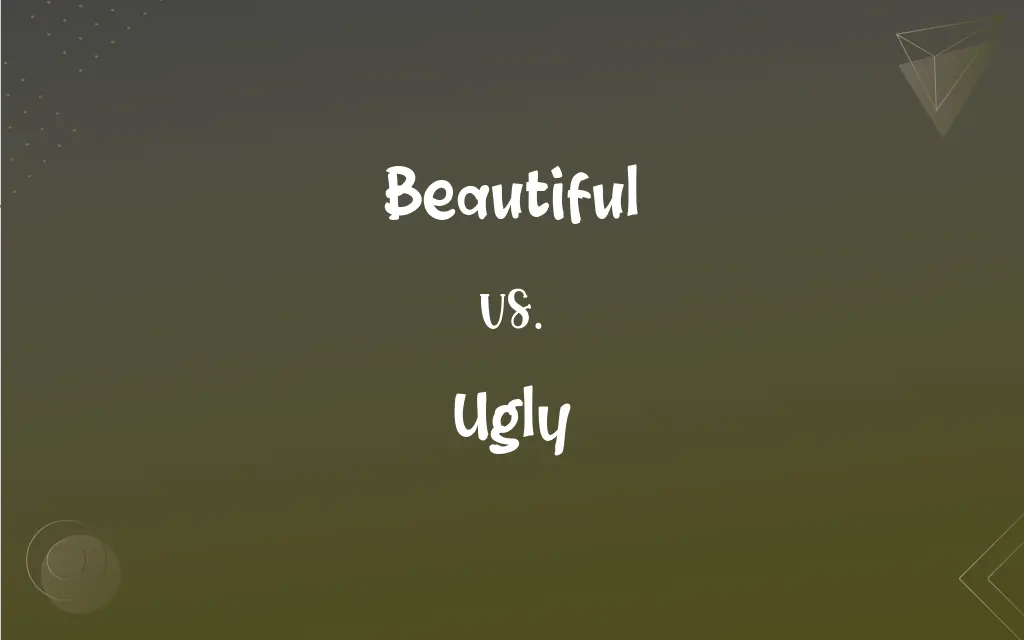Beautiful vs. Ugly: What's the Difference?
Edited by Aimie Carlson || By Harlon Moss || Published on January 2, 2024
Beautiful refers to possessing qualities that give great pleasure to the senses or mind, while ugly implies a lack of aesthetic appeal or attractiveness.

Key Differences
Beautiful is a term used to describe something that is aesthetically pleasing or delightful to the senses, whereas ugly is used to describe something that is unattractive or displeasing in appearance.
In art and culture, beautiful often signifies harmony, balance, and appeal, while ugly can represent discord, imbalance, and lack of appeal.
The perception of what is beautiful can vary greatly among different cultures and individuals, whereas the perception of what is ugly, though also subjective, often involves a stronger consensus of displeasure or disapproval.
Beautiful can evoke positive emotions such as joy, admiration, or contentment, while ugly often evokes negative reactions like disgust, aversion, or sadness.
In nature, beautiful is often associated with vibrant colors, pleasing shapes, and harmony, whereas ugly is frequently linked with dull colors, irregular shapes, and disharmony.
ADVERTISEMENT
Comparison Chart
Aesthetic Appeal
Pleasing, attractive appearance.
Unattractive, displeasing appearance.
Emotional Impact
Evokes positive emotions.
Often evokes negative emotions.
Cultural Perception
Subjective but generally positive.
Subjective, often with more consensus.
Representation in Art
Signifies harmony, balance.
Represents discord, imbalance.
In Nature
Associated with vibrant colors, harmony.
Linked with dull colors, disharmony.
ADVERTISEMENT
Beautiful and Ugly Definitions
Beautiful
Excellent, wonderful.
It was a beautiful performance by the orchestra.
Ugly
Unpleasant or repulsive to look at.
The abandoned building was truly ugly.
Beautiful
Pleasing the senses or mind aesthetically.
The sunset was breathtakingly beautiful.
Ugly
Morally reprehensible, unpleasant.
It was an ugly scene after the argument.
Beautiful
Conforming to ideals of beauty.
The bride looked absolutely beautiful.
Ugly
Threatening or ominous.
The sky looked ugly before the storm.
Beautiful
Possessing qualities that delight the eye.
The painting was a beautiful depiction of nature.
Ugly
Lacking grace or ease, awkward.
The sculpture had an ugly, cumbersome design.
Beautiful
Attractive in a graceful or delicate way.
The old town had a beautiful, quaint charm.
Ugly
Disagreeable, likely to cause trouble.
The negotiations turned ugly quickly.
Beautiful
Having qualities that delight or appeal to the senses and often the mind.
Ugly
Displeasing to the eye; unsightly.
Beautiful
Excellent; wonderful
Hit a beautiful shot from the tee.
Ugly
Repulsive or offensive; objectionable
An ugly remark.
FAQs
Can the definition of beautiful change over time?
Yes, standards of beauty evolve with cultural and social changes.
Is ugly always a negative term?
Usually, but some art movements embrace the aesthetic of the ugly.
Do beautiful and ugly have objective standards?
They are largely subjective and influenced by personal and cultural views.
Are beautiful and ugly used in literature?
Yes, they are commonly used for descriptive imagery.
Does ugly always mean unattractive?
Primarily, but it can also describe morally reprehensible things.
Can technology be beautiful or ugly?
Yes, based on design aesthetics and functionality.
Can attitudes or behaviors be described as ugly?
Yes, to describe something morally repulsive or unpleasant.
Can music be described as beautiful or ugly?
Yes, these terms are used to describe the aesthetic of music.
Is beauty always physical?
No, beauty can also refer to inner qualities or emotions.
Can something be beautiful and ugly at the same time?
Yes, depending on personal perception and cultural context.
Can landscapes be described as beautiful or ugly?
Yes, these terms are often used to describe natural scenes.
Are beautiful and ugly culturally dependent?
Yes, different cultures have different standards for these terms.
Can the same object be seen as beautiful by some and ugly by others?
Yes, perceptions of beauty and ugliness are highly subjective.
Does fashion use the concepts of beautiful and ugly?
Yes, fashion often plays with these concepts in design.
Can an action or event be described as beautiful?
Yes, particularly if it's admirable or aesthetically pleasing.
Is ugliness the absence of beauty?
Not necessarily; they are distinct concepts with their own qualities.
Can art be intentionally ugly?
Yes, some artists use ugliness to convey messages or evoke reactions.
Is beauty more than skin deep?
Yes, it often encompasses character and personal qualities.
Can architecture be beautiful or ugly?
Yes, based on design, symmetry, and cultural relevance.
Are there historical changes in what is considered beautiful or ugly?
Yes, these concepts have evolved over time.
About Author
Written by
Harlon MossHarlon is a seasoned quality moderator and accomplished content writer for Difference Wiki. An alumnus of the prestigious University of California, he earned his degree in Computer Science. Leveraging his academic background, Harlon brings a meticulous and informed perspective to his work, ensuring content accuracy and excellence.
Edited by
Aimie CarlsonAimie Carlson, holding a master's degree in English literature, is a fervent English language enthusiast. She lends her writing talents to Difference Wiki, a prominent website that specializes in comparisons, offering readers insightful analyses that both captivate and inform.






































































